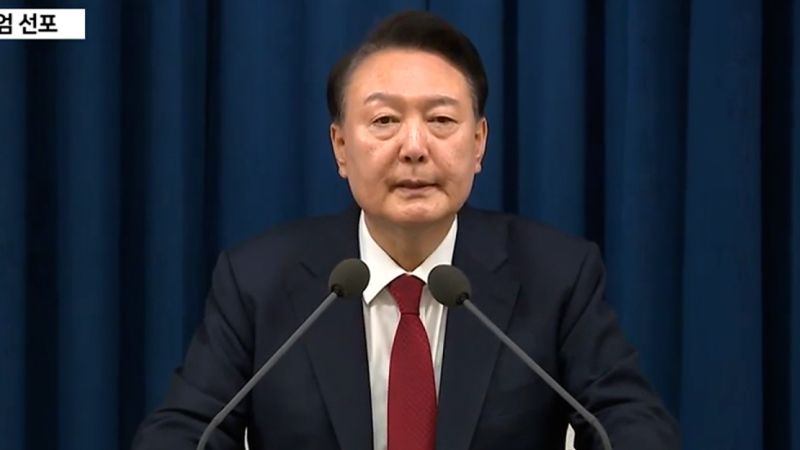South Korean President Yoon Suk Yeol declared martial law in an unannounced late-night TV address Tuesday, accusing the country’s main opposition party of sympathizing with North Korea and of anti-state activities.
The last time a South Korean president declared martial law was in 1980, during a nationwide uprising led by students and labor unions.
In the surprise announcement, he cited a motion by the opposition Democratic Party, which has a majority in parliament, to impeach top prosecutors and reject a government budget proposal.
Soon after, South Korean lawmakers voted to block the martial law decree, with 190 of the 300 members of parliament voting to overturn the measure.
The National Assembly chairman Woo Won-sik labeled the president’s announcement “invalid” following the unanimous vote and called on him to “immediately lift” the emergency measures.
Woo, a member of the opposition liberal Democratic Party, added: “The people should … rest easy. The National Assembly will defend democracy with the people.”
It was not immediately clear what effect the vote will have but under South Korean law, the president is obliged to comply.
Yoon had labeled the opposition’s actions as “clear anti-state behavior aimed at inciting rebellion.” He further claimed these acts have “paralyzed state affairs and turned the National Assembly into a den of criminals.”
He described martial law as a necessary measure to eradicate these “shameless pro-North anti-state forces.” He justified the decision as essential to protect the freedoms and safety of the people, ensure the country’s sustainability, and pass on a stable nation to future generations.
The president assured the public, “We will eliminate the anti-state forces and restore the country to normalcy as quickly as possible.” While acknowledging that martial law might cause some inconvenience, he promised efforts to minimize its impact on the public.
While Yoon did not clarify what specific measures would be taken, Yonhap reported, citing the full military decree, which bans all political and parliamentary activities and allows arrests without a warrant.
The decree also prohibits “denying free democracy or attempting a subversion,” and outlaws “fake news” and “manipulating public opinion.” People who violate the decree can be arrested or raided without the need for a warrant, Yonhap added.
Citing the same document, Reuters reported that “strikes, work stoppages and rallies that incite social chaos” are also prohibited. That includes doctors who had been engaged in a walkout; they have been ordered by the decree to return to work within 48 hours.
Just after 1 a.m. in Seoul on Wednesday morning (11 a.m. ET Tuesday), dozens of troops who had entered the main parliamentary building prior to the vote were seen withdrawing, according to Korean newspaper Chosun Ilbo and local television stations.
Some forces are still waiting within the National Assembly grounds, though some appear to have set down their gear, Chosun Ilbo reported.
Citizens waiting outside the building cheered when news came of the lawmakers’ vote, according to Chosun Ilbo – with some shouting, “Long live the Republic of Korea!” and “Yoon Suk-yeol, step down!”

The announcement sent shockwaves through the country. Residents in Seoul rushed to be with family members after martial law was declared across South Korea, according to a CNN team on the ground.
“Walking through the streets, there are people who are running to their families’ homes to be with them, to figure out what to do, to be close to loved ones in this moment that is unprecedented in so many of our memories,” Mike Valerio reported from Seoul.
People are being told by law enforcement that they can be arrested without warrants being needed, Valerio added.
“There are whole multitudes of people across (Seoul) who are stunned and are trying to figure out how an unpopular president made this move, what is going to happen next, and what this means for a democracy here in South Korea,” he said.
The chief of Yoon’s own political party, known as the People Power Party, condemned the move. Han Dong-hoon, who previously served as the president’s justice minister, said the declaration was “wrong” and he would “block it” together with rival lawmakers, according to Yonhap.
Meanwhile, Lee – the leader of the opposition Democratic Party – said the emergency martial law declaration was “unconstitutional,” calling it a move that “goes against the people,” Yonhap reported.
“President Yoon declared emergency martial law for no reason,” Lee said. “Tanks, armored vehicles and soldiers with guns and swords will soon control the country.”
Yoon, representing the conservative People Power Party, has served as president of South Korea since 2022.
He won election by a razor-thin margin, pulling ahead of rival Lee by less than one percentage point.
Yoon was a newcomer to politics, having spent the previous 27 years of his career as a prosecutor. Since taking office – succeeding the liberal President Moon Jae-in – he has faced a raft of challenges, from the perma-threat of North Korea to rising tensions between South Korea’s major partners, the US and China – as well as plummeting birth rates.
Yoon has long taken a tough stance on North Korea, a shift from his predecessor, Moon, who favored dialogue and peaceful reconciliation. Yoon lambasted this approach as “subservient.”
Yoon promised to bulk up South Korea’s military, even hinting he would launch a pre-emptive strike if he saw signs of an offensive launch against Seoul.
But he has faced political battles at home, sparring with the opposition Democratic Party, which has repeatedly impeached ministers and frustrated the government’s fiscal plans.
Yoon has seen his popularity ratings plunge since he took office – thanks to a series of scandals and controversies that even prompted hundreds of thousands to call for his impeachment.
This is a developing story and will be updated.
CNN’s Christian Edwards, Jessie Yeung, Paula Hancocks and Hanna Park contributed reporting.





